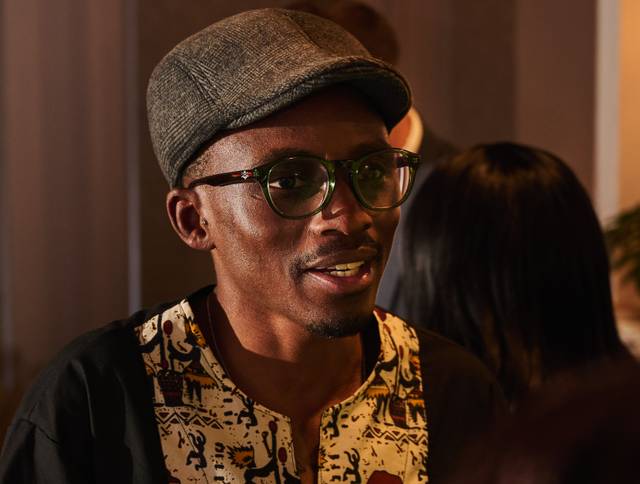
Scholar Stories
Music heritage and wellbeing
To celebrate Heritage month in South Africa, we spoke to Mandela Rhodes Scholar, Yamkela Ntshakaza who is pursuing a Master of Music dissertation in African Ethnomusicology at the University of Cape Town.
Tell us about your personal journeys into music.
After high school, I started an LLB degree at the University of the Free State. This was not my first choice, it was one motivated by family circumstances. I was raised by a single mother with two older brothers and a twin sister, so there was always pressure to find a financially lucrative career to help lessen the burden on my mother. But music was always in my blood. It’s what I would have pursued after school had my circumstances been different. While my twin sister is the more mathematical and analytical one (obtaining a B.Com Accounting degree), I’ve always been fascinated with music and the arts. At the end of 2017 I made the difficult decision to stop my law studies and start a Bachelor of Music degree at Rhodes University in 2018. Initially, my mother was mortified, but I told her it was what I needed to do, and assured her she would not have to pay a cent for my studies. She has been my core motivation since 2018, and I have since achieved academic excellence at Rhodes University (RU). RU recognised this, and I have since dedicated my time to performance, composition and music psychology and music education. I have learnt that music is a vessel for cultural and historical knowledge. It is social commentary, activism, advocacy, and it reminds us who and what we really are.
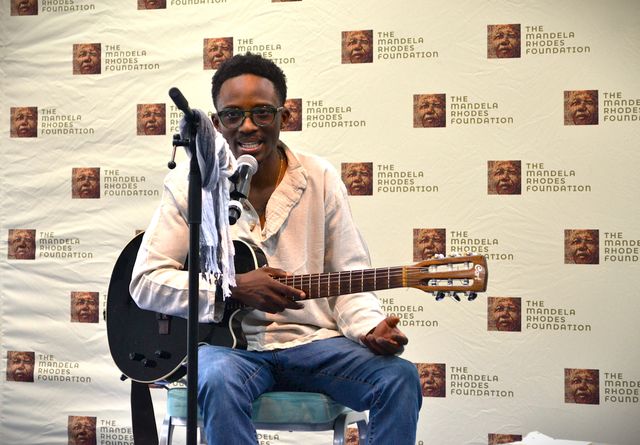
Tell us about your Mandela Rhodes journey and how you would like to create impact through your music.
My journey with the MRF has been incredible. I feel very blessed to have been a part of the 2023 cohort. Right from the interview stage, I was surrounded by incredible people who have done, are doing, and are going to do amazing things for their communities. As the only person pursuing an arts degree, it was hard not to feel like the MRF had made a grave error, by letting a muso slip through the Development Policy, Climate Change, Doctors and Lawyers net! But as time went on, I realised how important each one of us were for each other, and for ourselves. The Foundation has shown me that agency and impact manifests in many ways, cultivating my faith in the role of the arts in our society. Music’s impact is not always recognised as an agent of societal change. Through postgraduate studies in ethnomusicology (the study of music, society and culture), I feel confident in my ability to wield music as a tool for mental wellbeing. Even the most powerful leaders turn to musical therapy. Just listen to Barack Obama’s Spotify playlist! My role is simply to remind others not to underestimate the power of what they are listening to. Hip hop, for example, has had a profound impact on our society. From its roots in West Africa where rhythm and poetry was used in oral history, to the Southern African kwaito culture in the early 2000s, hip hop has contributed to how people behave, dress, talk, and treat each other. In short, music and art have not just served as social commentary, but as societal guides for a range of different circumstances.
You are studying the complex relationship between music and the cultures in which its performed and experienced. What came out of that study?
One of the most profound realisations I have had about music and culture is that music has purpose. But that purpose is determined by the society wielding the music. African drumming, for example, plays a significant role in influencing people's psychological behaviour, creating public awareness, and encouraging responses that contribute to the development of individuality and the building of collective identity within different communities. This phenomenon is well-captured by ethnomusicologist Anthony Seeger who says “At times, music may simply be something you make at church, listen to at the bar, sing around the house, or complain about when the younger generation listens. Then, at some moment, you may begin to employ a musical style as a resource to tell others who you are, and use it to interpret who other people are, and to indicate what a community aspires to.”
Music alone is inherently ambiguous, but it is people and societies who imbue it with a message. Spotify playlists are a great example of this. The same calming instrumental found under a playlist called “morning meditation”, can be used in a horror movie during a slow-motion scene of the most horrifying murder. The same AC/DC track that is enjoyed by millions at a rock festival can be used to torture hostages by being played at high volume for days at a time. Same music, different setting. I could go on forever, but I guess what I have found most fascinating is how humans can use music for whatever they want to achieve, so long as they set an intention.
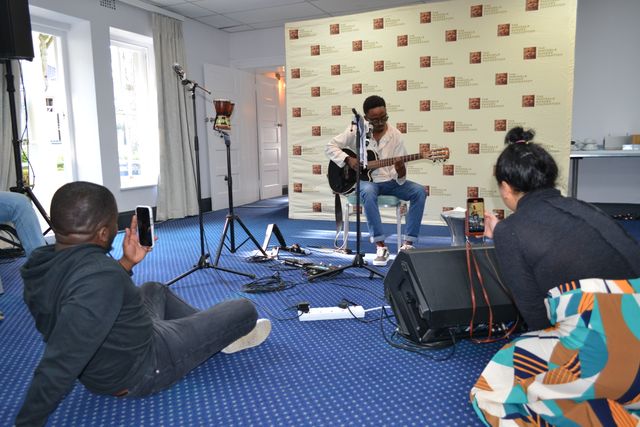
Is there a connection between music and mental wellness?
Absolutely. Watch what you listen to, pay attention to the words, are they encouraging you to see the good in yourself and others? Or are they encouraging you to behave in a reckless and self-serving manner? At a social level, the music in our environment determines how we feel and whether we want to stay at restaurant or bar we walk into. At an academic level, music has been used as an adjunct to clinical therapy sessions like guided imagery and meditation sessions, designed to help people conquer depression or traumatic events; assist elderly patients with Alzheimer’s or dementia to recall joyful moments in their lives; as well as help restructure neurological pathways in the brain for patients with Parkinson’s disease or other debilitating ailments. Where mental wellness is concerned, music can be applied in both clinical and recreational settings. From a more Afrocentric perspective, music employed by traditional healers for ceremonies and rituals, is imbued with intent and serves a specific purpose. No Xhosa man, for example, has returned from his pilgrimage without the accompaniment of amaGwijo and other welcoming songs sung by their community. Traditional healers often consult with clients who suffer from depression and anxiety, using percussive drumming, clapping, and singing to positively affect clients who – at a primal level – are reminded that their suffering is not theirs alone, that they have a support system to fall back on. So, in a nutshell, music has a profound efficacy in positive mental wellbeing practices.
Are there specific African music instruments that have been used to calm ourselves and promote wellbeing?
Of course! It goes without saying, that any instrument has the potential to promote the wellbeing of both the performer and the observer. In Zimbabwe, the Mbira is an instrument that is said to possess spiritual power. The instrument has a calming auditory timbre that is often compared to a harp or metal piano. I’d say the most famous African instrument used for the purposes of promoting wellbeing is the African Djembe. Dating back to the Malian Empire which spanned across West Africa and bordered the Sahara Desert between 1300 and 1500, substantial commercial interest has grown in the instrument’s ability to unite communities. The term Djembe is said to originate from the phrase “anke dje, anke be” (everyone gathers in peace). In the contemporary world, the Djembe is used in many drumming circles which are designed to promote mental wellbeing. The drum is a symbol of social cohesion and their therapeutic effects are well-established in academia. The instrument plays a significant role in influencing people’s psychological states and behaviour.
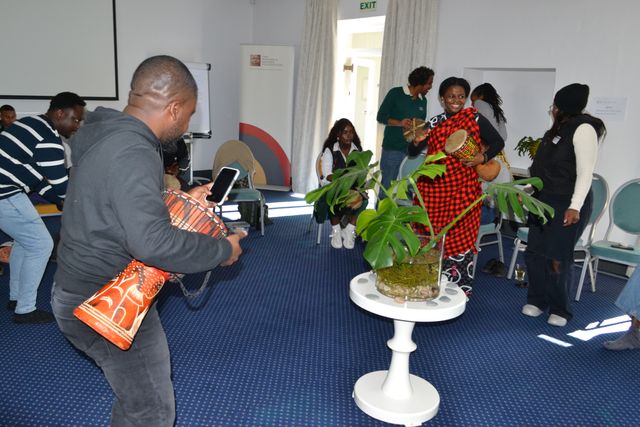
The Mandela Rhodes Leadership Development Programme involves inner healing. Has that changed how you approach your music?
In some ways I can say that it has. My music has always been about soothing my inner world and I have often tried to use it as a tool for storytelling in the hope that listeners would relate it to their pain and find some validation for the trials they might face. But the programme has reminded me that sometimes, people just want to hear music and enjoy it.
Where does Africa sit in the spectrum of wellness? How do you think the continent has dealt with emotional and mental wellbeing through music?
In Africa, the definitions of mental distress are often accompanied by spiritual rationalisations: “it must be an evil spirit”, or “you need to communicate with your ancestors or consult a traditional healer”. In addition, physical illness can be seen as an indirect cause of mental illness. The stress of not being well and being inundated with medical bills can cause serious depression and anxiety. The global opinion on Africa and mental wellness is that our continent is only just beginning to awaken to mental distress, and the various ways in which it can be treated, which is not necessarily true. Africans just perceive mental illness in a different way so in that sense, we have a myriad of ways to diagnose and treat mental illness, particularly through music. In the traditional San and Bushman cultures of sub-Saharan Africa, the San have for years, gathered in groups around a fire, and consulted a shaman to deduce the cause of any illness. Their gathering is accompanied by song and dance, to encourage the shaman to assume a trance-like state. Once in this altered state of consciousness, the shaman can consult with the spirit world and return with possible solutions for the ailments of his kin. Music is a crucial part of this process. The repetitive drumming, singing and handclapping are by no means only for entertainment. Also, the Xhosa, my kinsmen, play the Uhadi (musical bow) to remedy emotional distress by composing songs which detail their experience so they can remember what not to do, and to warn listeners not to follow that treacherous path.
In modern day Africa, our biggest issue is that there are simply not enough Western mental health practitioners to attend to the mental health needs of the population. According to data released by the South African Psychological Association in 2019, there is only one Western mental health practitioner for every 100,000 people on the African continent. So, it’s important that we begin to lend an ear to traditional and holistic health practitioners who make use of music and other creative art therapies so we can begin to bridge this treatment gap.
How do you incorporate and celebrate your Xhosa heritage through music? Is it important for the work you do?
I celebrate my heritage by using indigenous instruments like the uHadi and uMrhube, and I sometimes sing in Xhosa or sample amaGwijo. It’s important to keep your background and culture in mind when making music. But its also important to remember that your music might need to cater to a broader audience. There are many Xhosa musicians who celebrate and draw from our culture in their music (the likes of Thandiswa Mazwayi, Nathi, Vusi Nova, Simphiwe Dana, Mandisi Dyantyis, Ringo, the list goes on). So, for me, having been raised in a multilingual and multicultural generation, its always a balancing act. My main objective when making music is to emotionally relate to humans from all backgrounds, which is sometimes challenging to get right. Having a good knowledge of one’s cultural background can inspire creativity in many ways, so the acknowledgment is also important. Essentially, good music entertains, but incredible music entertains AND informs.
Looking at how you started your music journey, has your own healing contributed to how your music evolved?
100%. As a musician, I find it most ethical to draw from my experiences when composing music. So, in many ways, my music has evolved with me. My projects between 2015 and 2017 represent the era both lyrically and aesthetically. From 2018 to the present, my music has matured with me. Because art is so expressive, sometimes it can stay in the same loop as the person crafting it. So yes, I’d say my music has narrated my highs and lows, and continues to serve as a conduit for personal expression, much like a journal. There is always much to learn as an artist, but sometimes that learning depends on the state of the artist and whether they are ready to move forward.
.As we celebrate Heritage month, how can we as Africans take up more space in the wellbeing movement to ensure we are deeply rooted in our heritage?
I think we need to cultivate a culture of open-mindedness. Addressing the treatment gap in the country requires collaboration between Western and traditional practitioners. Africa is an incredibly diverse continent. We can learn so much from each other and wellbeing is something many African cultures have been able to deal with for centuries. The process has been slowed by policy and impending regulations from various pharmaceutical bodies, but communities like the Traditional Healers Associations are rising to the task by registering traditionally trained herbalists and medicinal practitioners, keeping them compliant with ethical codes of conduct so they can provide services that recognise African heritage and culture. Furthermore, to know thyself is an important point of departure. I always brag about how much I enjoy the company of my elders, because they hold vast amounts of knowledge regarding matters of wellness. Since African tradition stays alive orally, it might also benefit us greatly to set aside our textbooks and theories regarding mental wellbeing and draw from the knowledge of lived experience. One of my favourite sayings is “let experience be your teacher supreme”. So, we might nip issues of wellbeing in the bud by eating healthier, meditating on the bare earth, and slowing down to move at the pace of ooMakhulu nooTamkhulu (grandmother and grandfather).
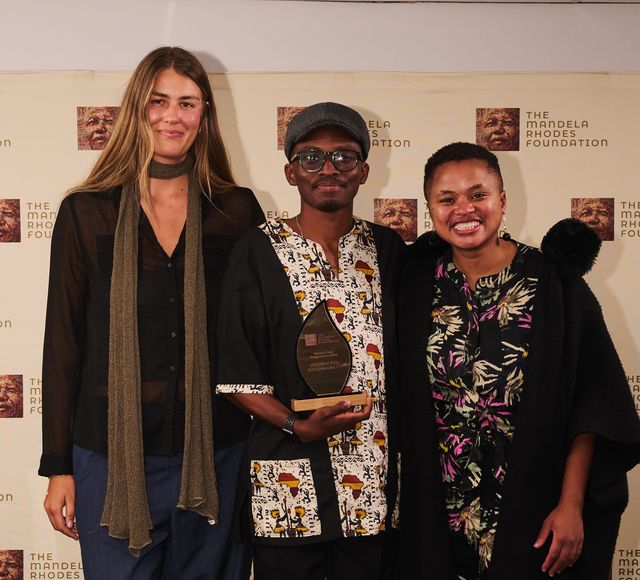
You have a dream to establish in your hometown, the first creative arts therapy centre: a collaborative effort toward reduced mental illness that is championed by students, ethnomusicologists, psychiatrists, neurologists and all relevant community stakeholders. How will that work?
To be honest, I do not yet know how I might achieve this. There are so many challenges and barriers such as funding, getting the community onboard and advocating for such a centre to exist. Though there are examples of such a centre in Makhanda (formerly Grahamstown), they lack psychological services from psychiatrists and neurologists. Students are always keen to make music, and the Eastern Cape has a fine reputation for its gifted student bands and choirs. But to tap into mental illness, there’s a lot of red tape, and I am not yet in a position to makes sense of that. But this is my vision:
A therapy centre working in collaboration with schools to identify students with learning challenges, which then enrols said students in intentionally crafted remedial sessions with skilled ethnomusicologists and psychiatrists, to give those students a chance to express themselves through that space. Because most mental illness issues arise before the child sets foot in the classroom, this endeavour might need full commitment from their parents, which is not always possible in the poorest parts of the Eastern Cape. Komani (formerly Queenstown) in general is rampant with poverty and lack of good governance, which fuels the fires of substance abuse, leaving most parents in constant states of survival and destitution. My dream is still in its infancy and will require collaboration with likeminded individuals who might give of themselves and ask for little in return. Incredibly difficult, but not impossible!
Who inspires you and why?
My mother. I really love my mother. Growing up, she lost her husband and our father in 2003 and was widowed at a young age. From the age of 6, I have watched her struggle to raise all four of us alone, but she somehow managed to put us all through school and help us pursue higher education, all on a maths teacher’s salary from a small school in Whittlesea in the Eastern Cape. I must admit, I was one of the worst children to raise. Looking back, I would’ve kicked me out if I was her! The older I get, the more she reveals to me how hard it was for her, detailing trips to and from the local Spar in the rain (she didn’t get a car until I was in Matric), shedding tears as the plastic bags tore into her fingers. There were no taxis to the suburb we lived in. My mother deliberately chose to live close to the best schools so that we could walk to school. She was the one who had to carpool to work every day. She has survived many taxi accidents to raise us, stretching out paycheques to buy us sports equipment we only used a few times, nurtured our home so that we never went hungry, always gave us the benefit of the doubt after advising us to do one thing while we did the opposite. What is most remarkable about her is that she is the same person to her school children as well as she is to her own children. As a Matric teacher, her favourite time of the year is calling her students in January after they have received their results to congratulate them and wish them all the very best for the future. Every now and then, some call her and tell her they have graduated from university and are entering the world of work, which often brings her to tears of joy. The way she speaks to them is exactly how she speaks to us. She has raised and supported many school children over the last three decades and she has remained a God-fearing mother who loves with all her heart. I would do anything for her. Anything.





